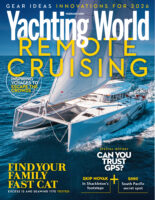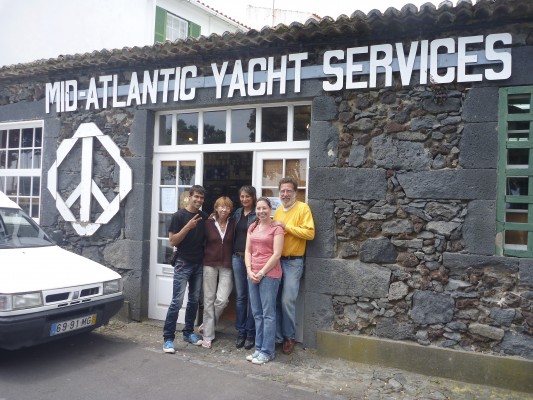Here are our top expert tips on sailing back across the Atlantic to Europe after a season in the Caribbean or the US East Coast
Gear and equipment tips
One man you are very likely to meet if you stop in Horta is Duncan Sweet. He is the owner of Mid-Atlantic Yacht Services, a family business he runs with his wife Ruth and daughter Leah and a very helpful staff.
Sweet, an American originally from New Hampshire, first came to the Azores by yacht in 1979 and returned permanently in 1990. “You could not buy an
impeller or a stainless steel screw here then. No one was paying attention to the 600 or 700 boats per year,” he says.
Today, around 1,200 yachts pass through every year, mostly between May and mid-July, and Sweet and his staff are the port of call for repairs and servicing.
As such, Duncan Sweet has a clear view of the most common problems and breakages. These are the main problems he sees and his advice on avoiding them:
9. Avoid rig failures.
“98 per cent of all the rigging problems we see,” says Duncan Sweet. “Normally it’s the lower shrouds or babystay and many times at the lower terminal, or at either end of the forestay where it’s been covered by roller furling.
10. Dodge fuel problems.
“Dirty fuel or microbes in fuel or water in the tanks are common. A lot of it is caused by O-rings at the deck fuel filler cap that have perished. Or boats have been sitting unattended in the Caribbean for eight or ten months and then rocking and rolling up to Bermuda.
Be smart and pre-empt these problems: take lots of engine fuel filters and lots of Racor water separator filters. And be prepared to do oil and filter changes yourself.
“I get people coming in here to ask us to do it and I have to say: ‘No, sorry, we don’t have time’.”
10. Tackle deck leaks.
“Leaks because of old hatch seals or dysfunctional locks or latches.”
11. Avoid autopilot failures.
“The biggest problem is under-specifying the pilot for the boat. And every four to five years or every two to three Atlantic crossings they need to be cleaned and serviced by a competent technician, especially if the boat is a little bigger than the spec for the pilot.
12. Carry a good stock of spares.
“The average time people spend here is four/five days. If you have to wait for spares that will be six/ten days, depending on the supplier at the other end, and the cost of transport for a pump is €60-80 per leg for the two legs [air freight].”
13. Carry spare zincs and bulbs.
“Zincs are important. Have spares. Some marinas have more electrolysis than others. Here we want zincs changed every six months. There’s so much electricity now on so many big boats. And make sure you have a spare compass bulb – or two.”
14. Try out your emergency steering.
“What can really perturb the onboard ambience is to lose the steering. How sensible a system is your emergency tiller, how easy is it to set up, is it easy to get the deck plate off and does it work or is it all rusty?”
15. Avoid crew problems.
“Pick carefully. The selection in Tortola, Antigua and St Maarten can be a bit thin so skippers sometimes misrepresent themselves. I see people given one expectation about the condition of the boat and the capability of the captain and they find leaky hatches or an engine that won’t start.
16. Sort out who is paying what.
“Shared expenses are a pain. People can pay US$1,200 from Bermuda to Palma and it all goes to custard by here. Be cautious.”
Heading the other way? Planning to sail to the Caribbean from Europe? Check out our ultimate guide on things to consider before you go here





